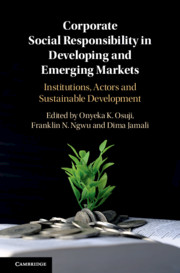 Corporate Social Responsibility in Developing and Emerging Markets
Corporate Social Responsibility in Developing and Emerging Markets Book contents
- Corporate Social Responsibility in Developing and Emerging Markets
- Corporate Social Responsibility in Developing and Emerging Markets
- Copyright page
- Dedication
- Contents
- Figures
- Tables
- Notes on Contributors
- Foreword
- Endorsement
- Preface
- Table of Cases
- Table of Legislation
- 1 Introduction to Corporate Social Responsibility in Developing and Emerging Markets: Institutions, Actors and Sustainable Development
- Part I Institutions, CSR Conceptualizations and Sustainable Development
- Part II CSR and Sustainable Development Cross-Country Studies
- 8 Firm Ownership and Corporate Social Responsibility in China: from a Multiple Stakeholder Perspective
- 9 The Dynamics of CSR, Mandatory CSR Laws, and Corporate Social Performance in India
- 10 Nigeria’s Informal Economy, Social Responsibility and Sustainable Development
- 11 The Environment in Shipping Incidents: Salvage Contracts and the Public Interest
- 12 Filling Institutional Voids in Thailand: the Case of Nestlé and the Seafood Coalition
- 13 Gender Composition of the Upper Echelons and Firm Sustainability Performance: an Examination of Istanbul Stock Exchange Companies
- Part III Normative and Utility Perspectives
- References
9 - The Dynamics of CSR, Mandatory CSR Laws, and Corporate Social Performance in India
from Part II - CSR and Sustainable Development Cross-Country Studies
Published online by Cambridge University Press: 18 December 2019
- Corporate Social Responsibility in Developing and Emerging Markets
- Corporate Social Responsibility in Developing and Emerging Markets
- Copyright page
- Dedication
- Contents
- Figures
- Tables
- Notes on Contributors
- Foreword
- Endorsement
- Preface
- Table of Cases
- Table of Legislation
- 1 Introduction to Corporate Social Responsibility in Developing and Emerging Markets: Institutions, Actors and Sustainable Development
- Part I Institutions, CSR Conceptualizations and Sustainable Development
- Part II CSR and Sustainable Development Cross-Country Studies
- 8 Firm Ownership and Corporate Social Responsibility in China: from a Multiple Stakeholder Perspective
- 9 The Dynamics of CSR, Mandatory CSR Laws, and Corporate Social Performance in India
- 10 Nigeria’s Informal Economy, Social Responsibility and Sustainable Development
- 11 The Environment in Shipping Incidents: Salvage Contracts and the Public Interest
- 12 Filling Institutional Voids in Thailand: the Case of Nestlé and the Seafood Coalition
- 13 Gender Composition of the Upper Echelons and Firm Sustainability Performance: an Examination of Istanbul Stock Exchange Companies
- Part III Normative and Utility Perspectives
- References
Summary
The chapter examines the social and cultural factors influencing CSR in India, the key drivers shaping the legislation mandating CSR in India, and the impact of this legislation on corporate social performance. It underscores the influence of culture, values, religion, traditions, and the role of ‘Dharma’ for CSR in India. It sheds light on the dynamics of CSR over time by examining how its nature evolved from the Ghandian trusteeship model into a more strategic version of CSR in the face of increasing FDI and growth of MNCs in India. The chapter suggests that such a shift in CSR has impacted the social contributions of firms necessitating formal legislation of CSR in India. Furthermore, it highlights that the lack of a binding code at the global level along with the voluntariness of CSR has compelled the Indian government to reshape CSR to prioritise local needs. It examines the impact of this mandatory CSR legislation on CSR activities along with its limitations. The chapter concludes by discussing the role of legal transplant theory, inventive interventionism and reflexive law for the development of a global CSR policy framework.
Keywords
- Type
- Chapter
- Information
- Corporate Social Responsibility in Developing and Emerging MarketsInstitutions, Actors and Sustainable Development, pp. 168 - 190Publisher: Cambridge University PressPrint publication year: 2019
References
- 3
- Cited by


